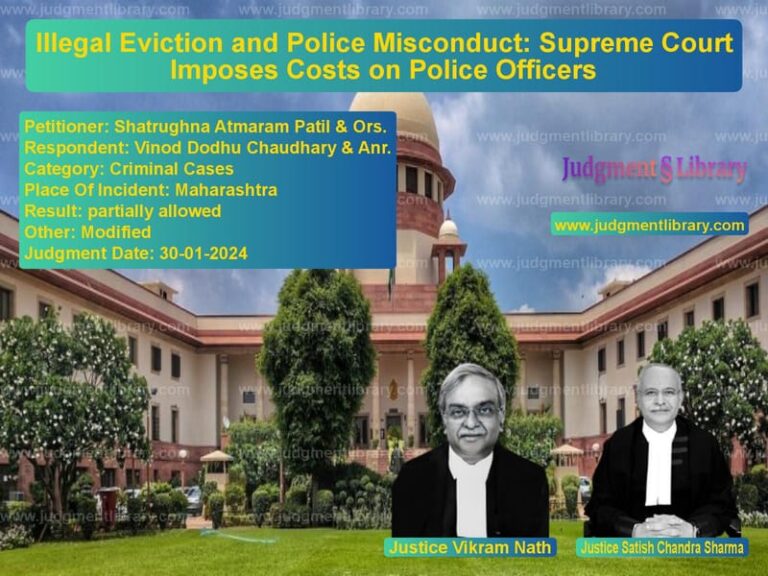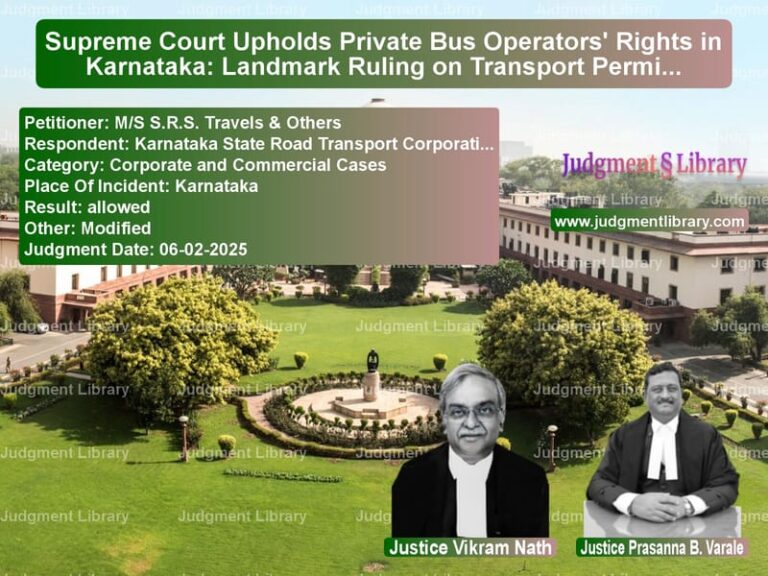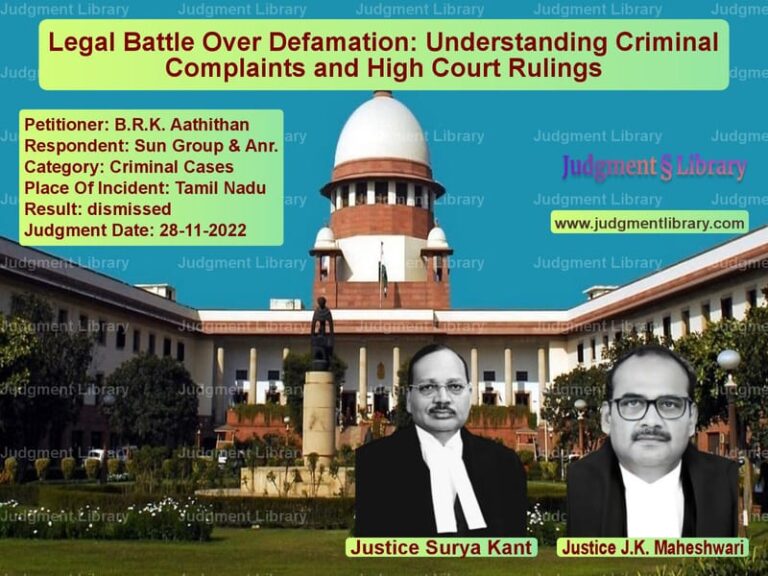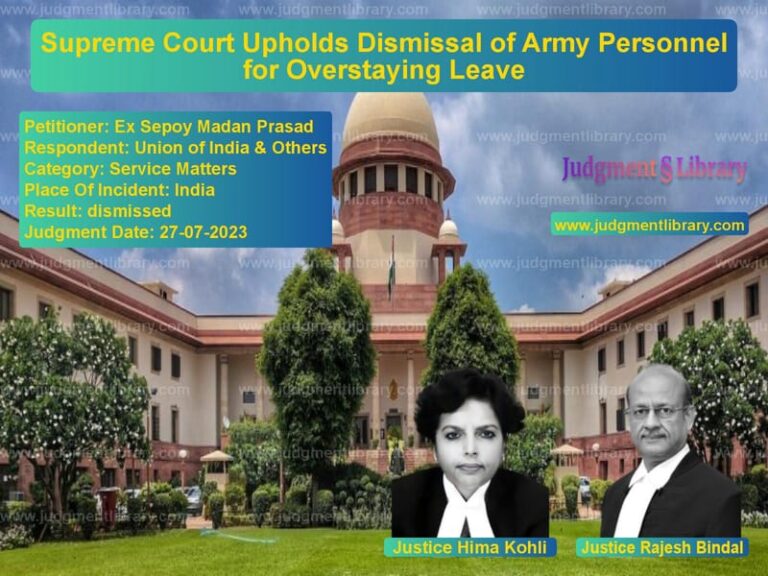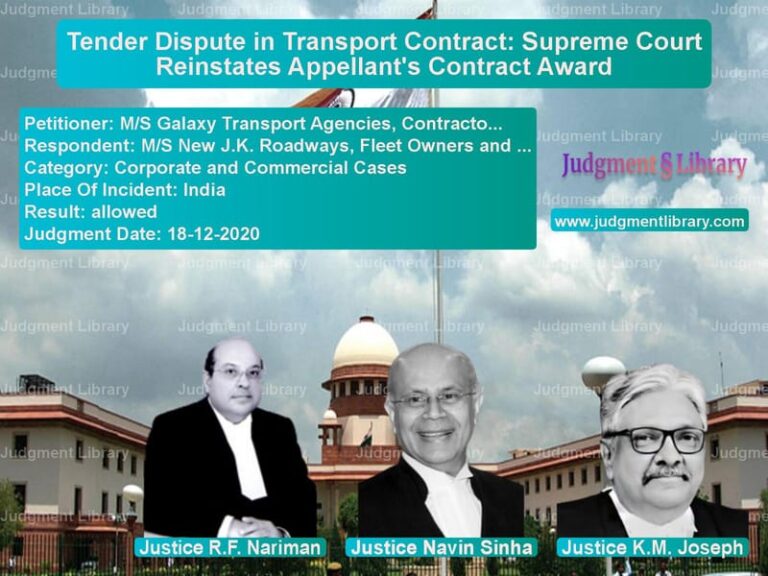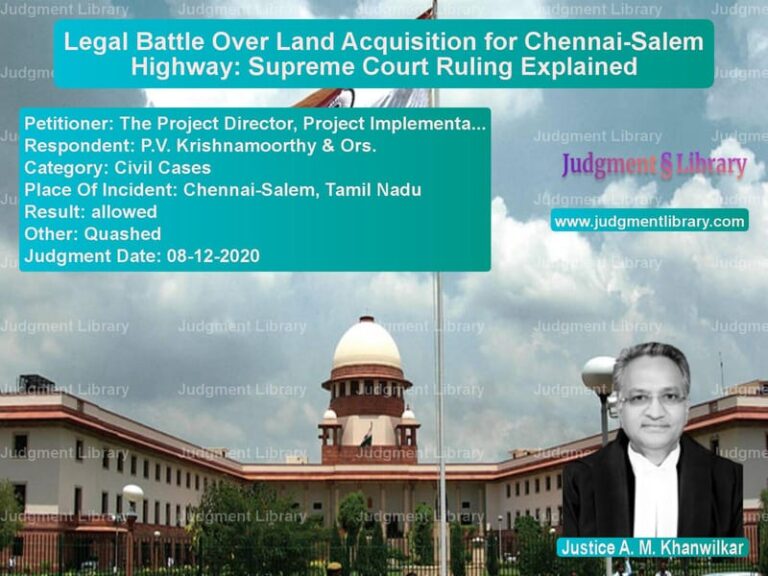Medical Termination of Pregnancy: Supreme Court Allows Woman to Abort 24-Week Fetus with Fatal Abnormalities
The Supreme Court of India, in its judgment dated February 7, 2017, delivered a crucial ruling in the case of Mrs. X and others vs. Union of India and others. The case revolved around the petitioner, a 22-year-old woman, who sought permission to terminate her pregnancy beyond the legally permissible limit of 20 weeks, citing severe fetal abnormalities that made survival impossible.
The Supreme Court granted the woman’s request, emphasizing that her right to bodily integrity, personal liberty, and reproductive choice should be upheld. The judgment reinforced that in cases where the fetus suffers from fatal congenital defects and continuing the pregnancy endangers the mother’s health, an abortion should be permitted even beyond 20 weeks.
Background of the Case
The petitioner, a 22-year-old woman referred to as Mrs. X to maintain confidentiality, approached the Supreme Court under Article 32 of the Constitution, seeking permission for a medical termination of her pregnancy. Her fetus, which was 24 weeks old at the time of the petition, was diagnosed with bilateral renal agenesis (absence of both kidneys) and anhydramnios (absence of amniotic fluid in the womb). Medical experts confirmed that the condition was fatal, with no chance of survival outside the womb.
The petitioner argued that carrying the pregnancy to full term would not only result in a stillbirth but would also cause severe emotional and physical trauma to her.
Supreme Court’s Intervention
Considering the gravity of the situation, the Supreme Court:
- Directed a seven-member Medical Board from KEM Hospital, Mumbai, to examine the petitioner and evaluate her request.
- Instructed the Medical Board to submit a detailed report on the viability of the fetus and the risks posed to the mother.
Medical Board’s Report
The Medical Board submitted its report on February 4, 2017, confirming:
- The fetus suffered from bilateral renal agenesis, a condition incompatible with life.
- The absence of amniotic fluid meant the baby would suffer from pulmonary hypoplasia (underdeveloped lungs), leading to respiratory failure at birth.
- The fetus had additional complications, including a double outlet right ventricle, ventricular septal defect, and two-vessel umbilical cord.
- There was a high risk of intrauterine fetal death (death inside the womb).
- The condition had no available treatment and no chance of long-term postnatal survival.
- Continuing the pregnancy posed a serious risk to the petitioner’s physical and mental health.
Legal Framework and the Medical Termination of Pregnancy Act, 1971
Under the Medical Termination of Pregnancy (MTP) Act, 1971, abortion is legally permitted up to 20 weeks, except when continuing the pregnancy poses an immediate risk to the mother’s life. Section 5 of the Act allows termination beyond 20 weeks only if necessary to save the life of the pregnant woman.
In this case, the Supreme Court noted that the Act was enacted at a time when medical technology was less advanced. The law did not account for cases where fatal fetal abnormalities were diagnosed after 20 weeks.
Petitioner’s Arguments
The petitioner argued:
- Forcing her to carry a non-viable fetus to term violated her right to personal liberty under Article 21 of the Constitution.
- The pregnancy posed a risk to her physical and mental health, as continuing the pregnancy would cause emotional trauma.
- The Supreme Court had previously recognized that a woman’s right to reproductive choices is part of her fundamental rights.
- Medical advancements now allowed early detection of fetal abnormalities, and the law should be interpreted to reflect modern realities.
Respondents’ Arguments
The Union of India, represented by the Solicitor General, argued:
- The law prescribed a clear limit of 20 weeks for abortion, and any deviation would require legislative action.
- However, the government did not oppose the petitioner’s request and left the decision to the Supreme Court’s discretion.
- A review by the Ministry of Health found no disagreement with the Medical Board’s findings.
Supreme Court’s Ruling
The Supreme Court ruled in favor of the petitioner, stating:
- The right of a woman to bodily integrity and reproductive choice was fundamental under Article 21.
- Continuing the pregnancy would cause grave injury to the petitioner’s physical and mental health.
- The MTP Act allowed termination beyond 20 weeks if two medical practitioners opined that the abortion was necessary to save the mother’s life.
- The Supreme Court had already upheld a woman’s right to reproductive choices in Suchita Srivastava vs. Chandigarh Administration (2009).
- The Medical Board’s report clearly established that the fetus was incompatible with life and posed risks to the petitioner.
Final Order
The Supreme Court ordered:
- The petitioner was permitted to undergo medical termination of pregnancy immediately.
- The termination would be carried out at the hospital where the petitioner had undergone medical evaluation.
- The Medical Board would supervise the procedure and maintain complete medical records.
- The hospital would ensure the petitioner’s informed consent before proceeding with the abortion.
Impact of the Judgment
This ruling set an important precedent:
- Recognized that pregnancies with fatal fetal abnormalities could be terminated beyond 20 weeks.
- Strengthened a woman’s right to reproductive autonomy under Article 21.
- Highlighted the need for legislative reform to expand abortion laws based on medical advancements.
Conclusion
The Supreme Court’s judgment in Mrs. X vs. Union of India was a landmark ruling that reaffirmed the fundamental right of a woman to make reproductive choices. By permitting the termination of a 24-week pregnancy with fatal abnormalities, the Court recognized the importance of medical evidence and individual autonomy in such sensitive cases.
Don’t miss out on the full details! Download the complete judgment in PDF format below and gain valuable insights instantly!
Download Judgment: Mrs. X and Others vs Union of India and O Supreme Court of India Judgment Dated 07-02-2017.pdf
Direct Downlaod Judgment: Direct downlaod this Judgment
See all petitions in Fundamental Rights
See all petitions in Public Interest Litigation
See all petitions in Legislative Powers
See all petitions in Judgment by S. A. Bobde
See all petitions in Judgment by L. Nageswara Rao
See all petitions in allowed
See all petitions in supreme court of India judgments February 2017
See all petitions in 2017 judgments
See all posts in Constitutional Cases Category
See all allowed petitions in Constitutional Cases Category
See all Dismissed petitions in Constitutional Cases Category
See all partially allowed petitions in Constitutional Cases Category


